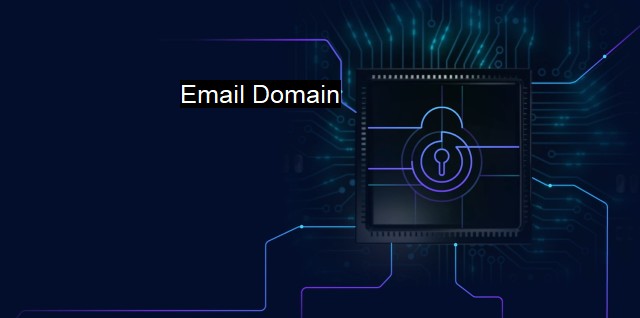What is Email Domain?
The Importance of Email Domain in Cybersecurity: Understanding the Threats and Validation Process
With the email domain is a particularly significant concept. An email domain is an integral part of every email address that helps provide essential information about the sender's email server. It is the part of the email address that comes after the '@' symbol. in the email address 'username@domainname.com', 'domainname.com' is the email domain. It acts as a wide-scale container for facilitating online communications through emails, covering individuals, organizations, or institutions that use the specific email service.A broad understanding of the email domains is essential for cybersecurity frameworks and strategies, signifying the protection of electronic systems, online communications, and data from malicious and undesired actions. Cybersecurity lays considerable significance on the safety and security of the email domain as it is frequently targeted by cybercriminals to gain unauthorized access to user's information and data, primarily through methods such as phishing and spoofing.
One notable method used by cybercriminals to manipulate email recipients is through 'spoofing' their email domain. Creating a falsified email domain that is very similar to a trusted and known domain name can cause the recipient to overlook the subtle differences, leading to potential data leakages and unauthorized access once the email has been opened or an embedded link has been clicked.
That being so, cybersecurity strategies are applied rigorously to protect email domains from such potential threats. Ensuring this security range from establishing more complex and incomprehensible password systems to leveraging comprehensive antivirus software.
The antivirus software plays a critical part in these cybersecurity measures. It essentially performs the initial and routine process of scanning emails and attachments for any potential virus or malware. If any suspicious software or file is found, the antivirus software either neutralizes it or moves it to a 'quarantine' location, where it cannot harm the protected system.
Advanced antivirus tools are well-equipped to perform email filtering. They can distinguish and remove spam emails, or those containing suspicious attachments even before they can reach the recipient’s inbox. They can recognize both known malware files and suspicious behaviour from unknown files, protecting the system from future, potentially harmful threats.
It is also important to ensure the email domain's integrity provisioned through its domain reputation. A bad reputation can hinder email deliverability by causing emails to be more likely flagged as spam or bounced back.
More evolved cybersecurity measures like DomainKeys Identified Mail (DKIM) and Sender Policy Framework (SPF) are further used to enhance email domain's security, these methods authenticate every outgoing email, protecting the organization from being spoofed, while confirming to the recipient that the email legitimately comes from the mentioned domain. Implementing these policies helps maintain the email domain's reputation and facilitates effective prevention of spoofing attacks and eventual phishing attempts.
Cultivating an environment, globally, that understands the critical nature of email domains and the risks posed by lack of appropriate safety measures, is crucial. Constantly updating oneself about the new threats emerging and appropriately equipping oneself with the necessary tools and knowledge can greatly enhance the security of one's email domain.
With email domains play an immense role. It stands as the identity of the user or an organization on the Internet, making it a major target for cyberattacks, therefore, it’s security measures, similar to how antivirus software and DKIM or SPF policies work, are not just accessory but necessary. The collaborative effort of the aforementioned strategies ensures a more robust shield against unwanted cyber threats. Understanding and implementing these strategic tools and best practices safeguard the email domain, preserving the integrity and confidentiality of the valuable data it holds.

Email Domain FAQs
What is an email domain?
An email domain refers to the part of an email address that comes after the "@" symbol. It identifies the domain name where the email is hosted, such as gmail.com or yahoo.com.How can email domains pose a cybersecurity risk?
Email domains can be used in phishing attacks where cybercriminals create fake email domains that look similar to legitimate domains to trick users into giving away sensitive information. Email domains can also be compromised and used to distribute malware or spam emails.How can I check if an email domain is safe?
You can check the reputation of an email domain using online tools that scan for spamming, phishing, or malware activities associated with that domain. You can also look for security certificates or credentials on the email domain's website to confirm its legitimacy.What is an antivirus program and how does it relate to email domains?
Antivirus programs are software tools designed to detect, prevent, and remove malware from computer systems. They can scan email messages and attachments for potential threats, including those coming from email domains that are known to be unsafe. Having an antivirus program installed can help protect your computer from cybersecurity risks associated with email domains.| | A | | | B | | | C | | | D | | | E | | | F | | | G | | | H | | | I | | | J | | | K | | | L | | | M | |
| | N | | | O | | | P | | | Q | | | R | | | S | | | T | | | U | | | V | | | W | | | X | | | Y | | | Z | |
| | 1 | | | 2 | | | 3 | | | 4 | | | 7 | | | 8 | | |||||||